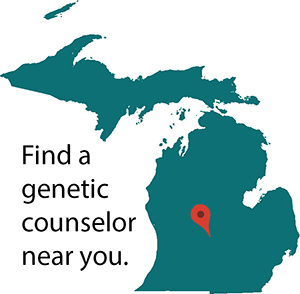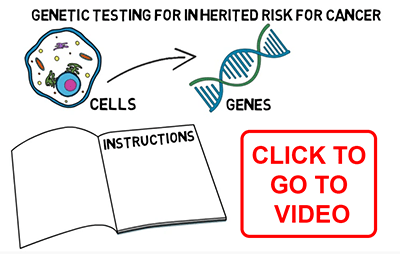The web Browser you are currently using is unsupported, and some features of this site may not work as intended. Please update to a modern browser such as Chrome, Firefox or Edge to experience all features Michigan.gov has to offer.
Resources for Patients
|
*** Do you have questions about hereditary cancer? *** A diagnosis of cancer is a scary and stressful time for an individual and their family. Some people may begin to wonder if there is a chance of other family members getting cancer as well. This risk depends on why the individual developed cancer. Cancer can be sporadic or hereditary. Cancer that is not caused by an inherited gene change (mutation or pathogenic variant) is called sporadic cancer. The chance that a family member will get cancer is not higher than anyone else when the cancer is sporadic. Most cases of cancer are sporadic. Cancer that is caused, in part, by an inherited gene change (mutation or pathogenic variant) is called hereditary cancer . Hereditary cancers often happen earlier in age than sporadic cancers. Sometimes, they can be more aggressive than the sporadic form of the same cancer. Other blood relatives may be at an increased risk of getting cancer if they have inherited the pathogenic variant that runs in the family. |
Finding a hereditary cancer condition in a family may help catch any cancer early and save the lives of at-risk family members. People with a hereditary cancer condition often have increased screening that happens earlier in age for the types of cancer they are at risk for. There are many genes that can cause a person to be at a higher risk of cancer if they are changed (mutated). The most common hereditary cancer conditions are hereditary breast and ovarian cancer (HBOC) and Lynch syndrome.
It is normal to have questions before seeing a genetic counselor. This information can help you decide if cancer genetic counseling might be right for you: Cancer Genetic Counseling: What to Know
Learn more about what to expect when meeting a genetic counselor: When Meeting Your Genetic Counselor
The Importance of Family History
A family's health history is often the first clue that a hereditary cancer condition is running through the family. It is important to ask about your family's health history. Try to learn the type of cancer a family member had and the age they were when diagnosed. It may also be important to know what type of treatment the family member had for their cancer. Some people write this information down so that they don't forget before seeing their doctor.
Genetic counseling and genetic testing can help you know if the cancer in your family has a hereditary cause. Not all cancer is passed down from one generation to another, but there are some "red flags" for hereditary cancer conditions.
- Multiple family members have been diagnosed with the same cancer or cancers that are related to each other.
- You or a family member was diagnosed before the age of 50.
- You or a family member had cancer that was bilateral (In both breasts, both kidneys, etc.).
- You or a family member had two primary cancer types.
- You or a family member was diagnosed with a rare type of cancer (ovarian, male breast cancer, pancreatic cancer).
- You have Ashkenazi Jewish ancestry.
If you are worried that your family may have a hereditary cancer condition, talk with your doctor or reach out to a genetics provider.
Your health care provider may make recommendations to improve your health and/or refer you to additional services. They may suggest you see a genetic counselor, have earlier screening, or take other preventive measures.
Try The Surgeon General's Family Health History Initiative resource to help you keep track of your family's health history.
Cancer Genetic Counseling and Testing
|
Cancer genetic counseling includes gathering and evaluating your personal and family health history. Your risk for hereditary cancer can be looked at by using this information. Cancer genetic counselors will look at patterns in your family history and may discuss genetic testing with you. There are many different genetic tests for hereditary cancer conditions. Genetic tests look at certain genes to see if there are any harmful changes in the DNA. The video linked on the right gives an overview of inherited risk for cancer and why genetic testing is important in finding out if you might be at risk. If you have any questions about hereditary cancer, a certified genetic counselor is available to provide non-clinical assistance at 866-852-1247. |
An important part of any recommended genetic testing is informed consent. Michigan law requires that health care providers must obtain the patient's written, informed consent before conducting pre-symptomatic or predictive genetic testing. Included in this consent is information about the condition being tested; risks, benefits and other implications of the genetic test; how the patient will be notified of the results and what they mean; and who will have access to the sample and test results.
- Directory of Cancer Genetic Clinics in Michigan
- Find a Genetic Counselor through the National Society of Genetic Counselors
- Written Informed Consent for Genetic Testing: What Michigan Patients Need to Know
- Informed Consent Comics: Is Genetic Testing Right for Me?
- Informed Consent Video: What Do I Need to Know Before Genetic Testing?
Cascade Screening
Some people have a family member that has already had genetic testing and a pathogenic variant was found. If someone carries a pathogenic variant that causes hereditary cancer, their parents, children, and siblings have a 50% chance of carrying that variant. Cascade screening involves sharing test results with family members so they can be tested for the same pathogenic variant. When you share your genetic results with a family member, their testing is more informative and may be cheaper.
Talking with family members about their risk for hereditary cancer can be hard, but this information can help save lives.
Ask your health care provider about ways you can share this information with your family. A qualified cancer genetic professional can also provide guidance about communicating test results and what they mean.
For more information about cascade screening, click the link below:
Contact Us
If you have questions, call the MDHHS Hereditary Cancer Hotline at 1-866-852-1247 or email genetics@michigan.gov. For cancer genetic counseling and testing services in your area, visit the Directory of Clinical Cancer Genetic Services in Michigan.
Public Health Genomics Section
Lifecourse Epidemiology and Genomics Division
P.O. Box 30195
333 S. Grand Avenue
Lansing, Michigan 48909-30195
Funding for this program was made possible (in part) by the Centers for Disease Control and Prevention. The views expressed in written materials, publications, or webpages do not necessarily reflect the official policies of the U.S. Department of Health and Human Services, nor does the mention of trade names, commercial practices, or organizations imply endorsement by the U.S. Government.
Last updated: 3/28/2025

